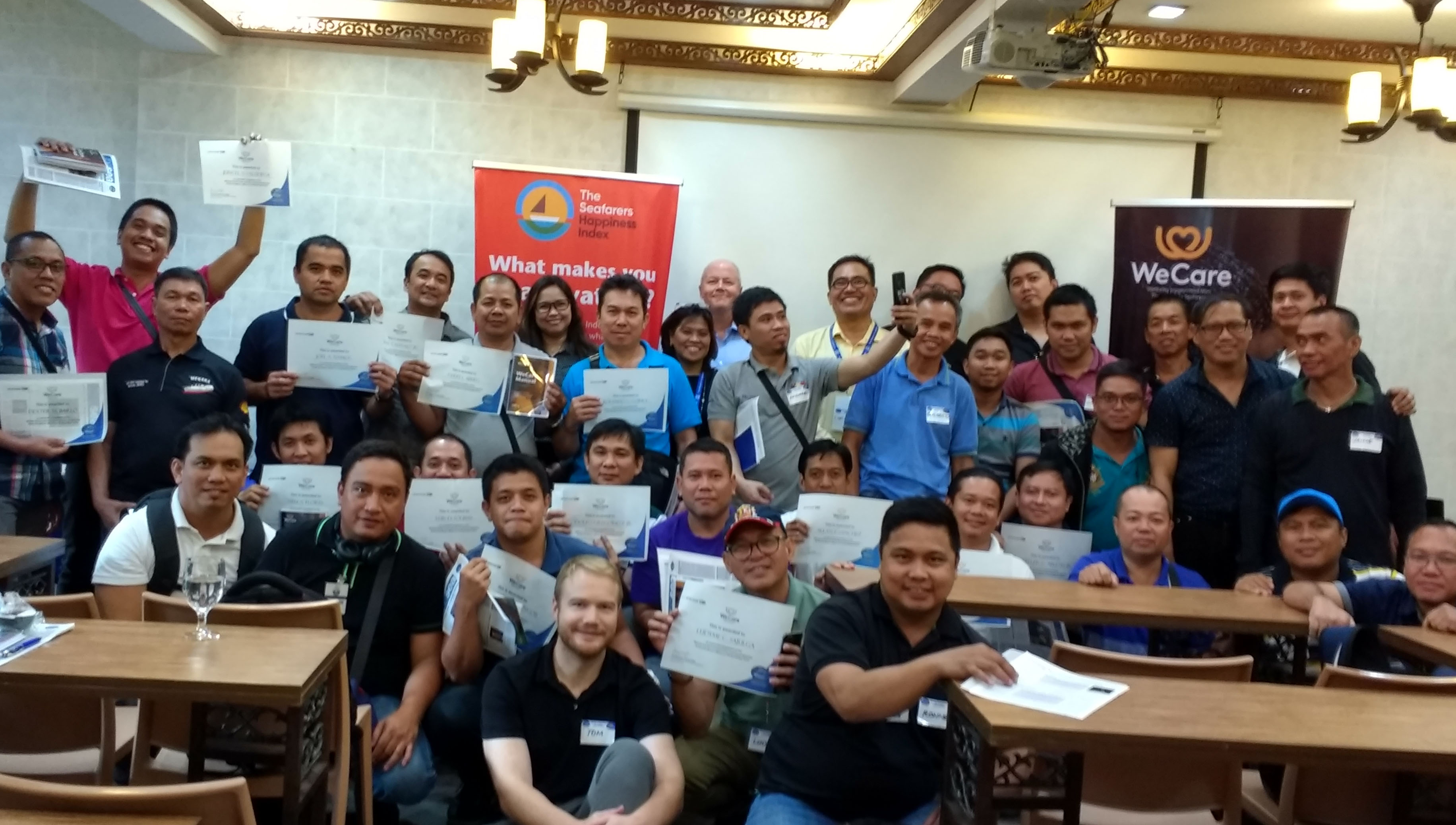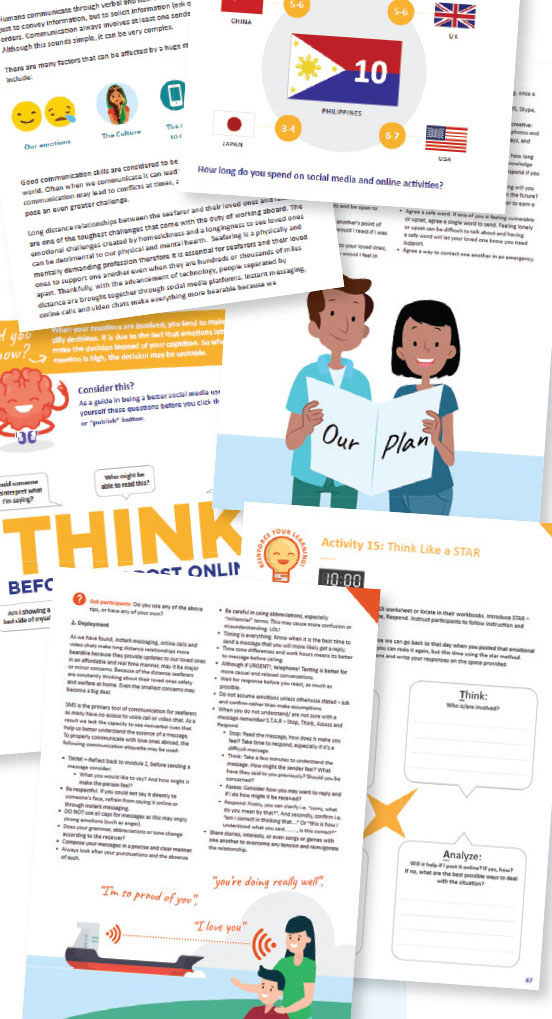- Topics
- Campaigning
- Careers
- Colleges
- Community
- Education and training
- Environment
- Equality
- Federation
- General secretary message
- Government
- Health and safety
- History
- Industrial
- International
- Law
- Members at work
- Nautilus news
- Nautilus partnerships
- Netherlands
- Open days
- Opinion
- Organising
- Switzerland
- Technology
- Ukraine
- United Kingdom
- Welfare
Communicating with Care – how an education scheme helps seafarers and their families navigate social media
28 January 2020

The Mission to Seafarers has become a leader in the field of mental health for maritime professionals, and social media use has loomed large as a threat to wellbeing. Sarah Robinson hears how the welfare charity is seeking to address the challenges of online communication for seafarers and their families through a popular new education scheme
As we enter the third decade of the 21st century, online communication has become a part of all our lives – yet it's still new enough that we sometimes struggle to make the best use of it.
Who hasn't accidentally sent an email or text message to someone who wasn't meant to receive it? And is it really better to copy in numerous colleagues to an email than to speak to one or two in person?
Seafaring brings its own online communication challenges. For instance, Nautilus has dealt with cases of members in trouble for revealing their vessel's location on social media when this was against company policy. But it is in the personal sphere that the majority of difficulties arise for seafarers and their families, according to the maritime welfare charity Mission to Seafarers (MtS).
Online communications have the potential to ease some of the burdens of maintaining a long-distance relationship and coping with a parent being absent. However, the technology must be used wisely, says MtS.
The charity's project manager Thomas O'Hare gives two examples of what can go wrong. 'One thing we've encountered is when a family member sends a message via an app such as WhatsApp or Facebook Messenger, sees the symbol indicating the message has been picked up onboard ship and then becomes anxious when the seafarer can't reply straight away,' he explains.
'When a vessel doesn't have onboard wi-fi, we often see another problem: the seafarer logs into their communication apps when in port and is distressed by the numerous requests for help from home that have built up while they were out of range.'
To tackle this issue, MtS has developed a project called WeCare, which aims to work with seafarers and their families to train them in the responsible use of online communications. Funded by the UK P&I Club, the scheme offers two courses free of charge to any company that is a member of the Club, and these can also be delivered by MtS volunteers to seafarers' families and friends under certain circumstances.
The WeCare courses – Social Communications and Financial Wellbeing – were piloted in mid-2019 in the Philippines, where MtS has for several years been developing a family support network for maritime communities. The network has local branches or 'chapters' run by volunteers with the backing of staff at the MtS Flying Angel centre in Manila. There is a strong structure to the network, and each chapter must have a president, an activities coordinator and a training officer.
The chapters organise community festivals for occasions like Christmas and Easter, as well as events that are more explicitly targeted at improving the wellbeing and mental health of seafarers' families. WeCare has been eagerly welcomed by many chapters, and thanks to the training officer post, there is always someone in place who can deliver the courses.

During the pilot, the courses were also delivered to seafarers on Shell vessels that happened to be berthed in Manila, but WeCare is not specific to the Philippines, said Mr O'Hare. 'We started there because it's the world's biggest supplier of seafarers and such a large number of people are affected by the issues in the courses, but WeCare is intended to work anywhere.'
In recent years, MtS has become a leading advocate for improving the mental health and wellbeing of seafarers, and WeCare is part of that work. 'In our research, we found that relationship problems and financial issues were the main causes of poor mental health in the maritime community,' said Mr O'Hare, 'and social media can exacerbate these difficulties if it's not used wisely.'
The WeCare courses therefore aim to give seafarers and their families a better understanding of the technology they're using, as well as the psychological and linguistic tools to work out their differences before a crisis point is reached.
'So we start at the beginning by asking what social media is and how it is used,' Mr O'Hare explained, 'and then we look at how a couple could manage it within their own relationship. Which social media should they use, and what rules should they set up around communication? Families might want to learn more about how a seafarer's job onboard could prevent them from replying straight away, and they could set up an agreement about how long they should wait for a reply before starting to worry.'
We use a technique called STAR, which stands for Stop, Think, Assess and Respond
The courses also help people think about what action to take in the event of a financial emergency at home. Could the family access local support rather than sending urgent messages to a seafarer who may feel distressed at being unable to help from a distance?
'Feedback from the pilot has shown us that the seafarers and their families appreciate training on how to raise difficult subjects,' noted Mr O'Hare, 'and they find our mnemonics useful. We have one technique called STAR, which stands for Stop, Think, Assess and Respond, and that's a really a way of taking a deep breath before firing off a message that may come across as more critical or upsetting than the person intended. And the whole WeCare project is underpinned by the principle of TRUE: Trust, Responsibility, Understanding and Empathy.'
There is a training manual for those delivering the courses, and a workbook for participants. The student workbook is A5 size so it may fit in a bag or seafarer's locker. Infographics, exercises and key points are highlighted, and the examples are non-gendered to promote inclusivity. The trainer's manual is A4 size to allow the trainer to make notes and adapt the material to their audience, and there are colour coordinated lesson plans to help the trainer plan and deliver the workshop.
These materials are written in English – a decision that has been reinforced by feedback from the pilot project. Mr O'Hare explained: 'When trainers are delivering the course, they are welcome to use a local language, like Tagalog in the Philippines, but our feedback indicated that participants did not need or wish the course materials to be translated.'
Following the successful pilot, full delivery of WeCare began in October 2019, and there will be an assessment of how the project is working later in 2020. 'We'll have focus groups to see how much people are using what they've learnt and if it helps,' said Mr O'Hare.
Meanwhile, an e-learning version is being developed to help with international delivery, and in the Philippines, WeCare has already become so highly thought of that MtS has had requests for new family network chapters to be set up so more communities can benefit from its teachings. Rather aptly, WeCare now even has its own Twitter account – for responsible communication of course.
- to make a request for WeCare to be delivered onboard a vessel, in company offices or to a community group, contact Jan Webber at jan.webber@missiontoseafarers.org. The courses are free to companies who are members of the UK P&I Club, and rates can be negotiated for other companies who are interested.
- follow WeCare on Twitter:@MtsWecare
Tags
